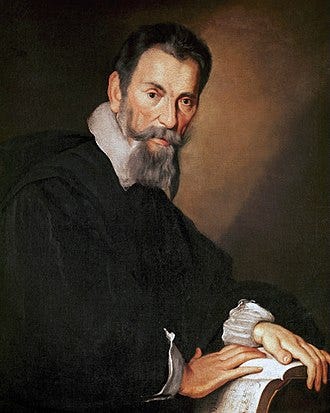Monteverdi and students
Seventeen Voyces
Monteverdi by Bernardo Strozzi (c. 1630). Source: Wikipedia
On Sunday, February 25, before a packed audience in St. Matthew’s Anglican Church in the Glebe, Kevin Reeves’ Seventeen Voyces presented an afternoon of Italian baroque. Most of the music was by baroque pioneer Claudio Monteverdi (1567-1643). Also heard were two pieces by his former choir boys and students, Francesco Cavalli (1602-1676) and Giovanni Antonio Rigatti (1613-1648).
Joining the choir were members of the Ottawa Baroque Consort with special guest Kerry Bursey playing the theorbo, a 6 feet long, 14-string bass instrument of the lute family. Former Seventeen Voyces member Joel Allison also joined the choir and gave a solo performance (with continuo) of Monteverdi’s Laudate dominum, a virtuosic showpiece that demonstrated why Monteverdi is considered the father of opera! (The only versions I found on the internet are sung by soprano, such as by the very animated Josefien Stoppelenburg here; as in the concert, the continuo includes the theorbo. I liked the bass version better!)
Opening the concert was Monteverdi’s Beatus Vir (Blessed is the Man; 1640; from the opening lines of Psalms 1 and 112), a 6-part upbeat and joyful piece. (You can hear it here in a 2008 performance by the Taverner Choir and Consort. Many other performances are also available on the internet.) This was followed by Cavalli’s 6-voice Magnificat.
Other Monteverdi works were a Gloria for 7 voices (here is a 2021 recording of it by Lionel Meunier & Vox Luminis; again, many other versions are available) and Hor che’l ciel e la terra (Now that the sky and the earth and the wind are silent), for six voices (listen to it here, with score and text, performed by Concerto Italiano led by Rinaldo Alessandrini), the latter a piece that starts from the depths of the earth and continues as one long lament. The concert ended on a more upbeat note with Rigatti’s Confitebur tibi Domine (I will give thanks unto the Lord; the only version I found has a quite inferior sound, here).
After intermission, at the request of an audience member, Kerry Bursey, who is also a tenor, sang and played Come again (1597) by John Dowland.
Altogether a most enjoyable concert. Attendance was likely helped by Reeves’ and Allison’s interview on CBC the day before. The only problem was the balance of voices: Seven sopranos, five altos, four tenors and three basses (yes, that adds up to 19!) Surprisingly, the bass part came through quite well despite their low number; most missed in the balance was the tenor part.

